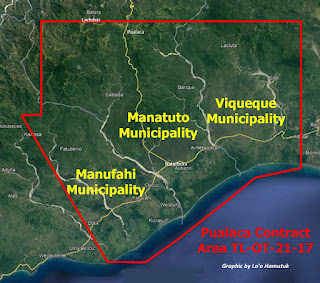As some people know, on 24 June 2022, TimorGAP launched the Pualaca Block project with a socialization program for their petroleum exploration activities in contract area PSC-TL-OT-21-17, after signing the Production-Sharing Contract (PSC) in December 2021. The Government awarded this PSC to TimorGAP through a secret process – there was no public tender or opportunity for other companies to make proposals.
Petroleum and gas extraction activities have two main phases – exploration (research) and production. In the first phase oil companies begin to look for information and collect data, including through seismic research and test wells. From industry-wide experience, most of this research does not find a reserve with enough commercial value to justify production.
One past well in the contract area is in the Pualaca aldeia in Laclubar suku: a small oil and gas deposit among several seeps scattered in this area, as local people know. This field has been developed since 1892, in the Portuguese period, and produced oil for local consumption through a small refinery which was run by Dr. José Ramos-Horta’s older brother. Oil and gas has seeped into the local environment there for more than 130 years; there is no strong reason to believe that there’s enough left for commercially viable production. At its peak, annual production from Pualaca was less than Bayu-Undan produces every half-hour.
TimorGAP is beginning these exploration activities as operator and 100% owner; before now their other projects were always operated by their joint venture partners, including Eni, Timor Resources, Woodside and SundaGas. Operating without any experience increases risks to the community and the environment, and TimorGAP has never done these activities before.
Prior to the 24 June event, the relevant authorities – the National Petroleum and Minerals Authority (ANPM) and Ministry of Petroleum and Mining (MPM) – had not shared the contents of the PSC on the internet or the Jornál da República. However, ANPM did publish the contract on their website this week, after La’o Hamutuk reminded them it was legally required. According to Article 29 of the Petroleum Activities Law, the Ministry must publish a summary in the Jornál da República and make the full text publicly available.
The Pualaca Block covers 1,575 km2 in three municipalities, from Laclubar, Natarbora and Barique (Manatuto) to Fatuberliu (Manufahi) and Dilor (Viqueque). TimorGAP and its subsidiary plan to conduct aerial research (Full Tensor Gravity Gradiometry - FTG)) before deciding to proceed with the seismic research phase. We understand that they have contracted the FTG work to be done during July, but we have not yet seen any sign of a Terms of Reference or initial process for environmental licensing. As project proponent, TimorGAP must present a proposed Environmental Impact Statement and Environmental Management Plan when they apply for a license, and the lengthy process requires transparency, public consultation and thorough analysis before the operation can start.
At this launch, in addition to the Minister of Petroleum and Mining and the ANPM, civil and military authorities from all three municipalities participated, including PNTL and F-FDTL commanders. TimorGAP, ANPM and MPM gave general explanations that Timor-Leste needs to continue to look for and produce petroleum because Bayu-Undan is almost empty and the Petroleum Fund will run out in ten years. They also explained that the industry needs people with specific, high-level skills, and will establish a team to bring together representatives for detailed consultation in specific places. In their speeches, police commanders tended to threaten and use harsh language directed to local people, especially the youth. In the discussion period, participants suggested that when petroleum activities are underway, it would be better to promote healthy dialogue than this approach of showing force and bullying people to comply.Due to limited time for discussion, La’o Hamutuk was not allowed to speak or ask questions at the socialization event, although we appreciate that people from the community and students raised important issues and received good responses from MPM, ANPM and TimorGAP. The respondents promised to introduce local content, but failed to explain how they would involve people from the local area, saying that they should wait until the speeches are over to realize truly participatory consultation, knowledge, and mutual understanding, including providing more complete information to people in affected communities. About 200 people, mostly men, attended the event; many came from Dili as well as 20 police, some soldiers, and community representatives.
La’o Hamutuk thinks that a better way for the Government of Timor-Leste to move away from depending on nonrenewable oil and gas resources is to promote agriculture and transformative industries. We should use some of the money invested in financial markets through the Petroleum Fund to improve our human resources and develop a diversified, sustainable economy. We believe that unleashing ourselves from petroleum dependency is the first step along a genuine pathway which will be more equitable and just, addressing long-existing structural problems.
We appreciate the closing intervention by the President of TimorGAP that indicated there will be deeper consultations to hear various parties’ rights, concerns and interests before the process proceeds. We encourage everyone involved to use these opportunities to help local people understand the unmentioned risks which will come with petroleum activities in the contracted areas.
Thank you.









